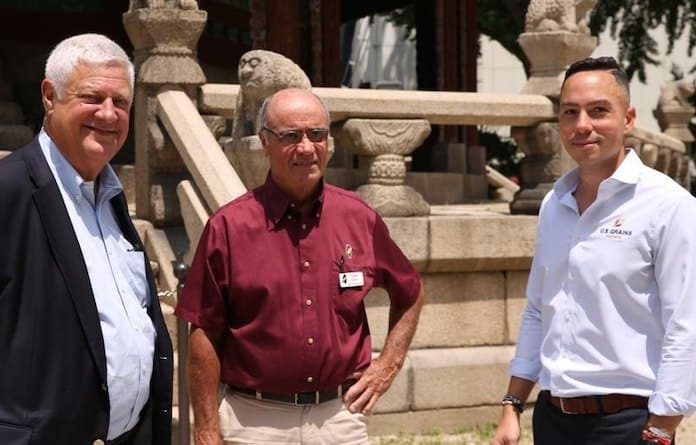Haudrich talks kernels in Korea

A local farmer recently traveled to South Korea as a representative of the Illinois Corn Growers Association to speak about the benefits of U.S. corn to delegates from 15 nations.
District 14 Director of the Illinois Corn Marketing Board and member of the Illinois Corn Growers Association Dale Haudrich of Hecker was accompanied by several other representatives of American agriculture during a Wet Milling Conference in Seoul, South Korea, hosted by the U.S. Grains Council.
Haudrich said he’s lived on the family farm just a mile outside of Hecker his entire life, taking over the operation from his father.
As a member of the Illinois Corn Marketing Board, Haudrich said one of his focuses is development. He and his peers – besides managing state corn checkoff funds – specialize in looking at ways to lessen the ecological impact of corn production.
“Our development is looking at different ways of being more conscientious of the environment in our farming practices,” Haudrich said.
Along with this research, Haudrich said they also focus on agriculture education and, of course, marketing.
It’s with his knowledge in these areas that Haudrich volunteered and was selected to speak during the international conference in Seoul.
The event drew attendance from representatives of Turkey, Mexico, Taiwan, Vietnam, India and several other countries.
Haudrich said his presentation was primarily meant to espouse the benefits of U.S. – particularly Illinois – corn.
American corn, he said, has a unique composition, with an especially soft endosperm – the primary component of the kernel – in which starch is especially rich and easy to extract.
Other foreign-grown corn tends to have a harder endosperm, in contrast.
While American corn has a large amount of starch, its softness also means it is particularly delicate when it comes to shipping and transportation.
“Our biggest hurdle, I think, in selling our product to them is that, because our corn is a softer kernel… it is more subject to handling damage,” Haudrich said. “So when it gets to these ports of call in other countries, it’s cracked.”
It was the goal of Haudrich and his peers at the event, then, to describe the benefits of U.S. corn even with this limitation.
“We’re trying to teach them that there is a lot of extractable starch in that cracked kernel,” Haudrich said.
Beyond its biological makeup, there are a number of scientific and logistic benefits that make Illinois corn stand out.
For one, Haudrich spoke to the soil quality of Illinois and much of the Midwest, noting that the state is the second biggest cultivator of corn behind Iowa.
“We’re in the center of the Corn Belt,” Haudrich said. “Our soils are very good compared to some countries.”
Illinois’ central location also lends it the benefit of transportation access.
Haudrich described how a hub of trains is able to move Illinois produce across the country while the Mississippi River provides the state with access to international shipping overseas.
He also touched on the cultural aspect of Illinois agriculture, with a great deal of the state’s farming down by family farms which tend to be interested in minimizing damage to the environment so as to keep the land healthy and prosperous for future generations.
“Family farms, we’re part of the effort to keep farms as they are or better than when we got them,” Haudrich said.
On this point, he also spoke about some of the benefits that modern technology has provided family farms, with consideration of many soil types and fertilizers now easier while various aspects of farming continue to be made more efficient.
Haudrich was generally positive about his time visiting South Korea, saying it was a great experience to get to stay there for the conference.
He expressed interest in participating in another such event should the opportunity arise in the future.
Haudrich also spoke positively about the current farming season. He had originally been afraid that the conference would interfere with his planting time, but he was ultimately able to get his fields ready just before he departed.
“This year, the spring has been great,” Haudrich said. “We got everything planted and basically up and growing before I even left.”
Despite the solid start to the season, he is hopeful for some rain to put an end to the recent dry spell.






